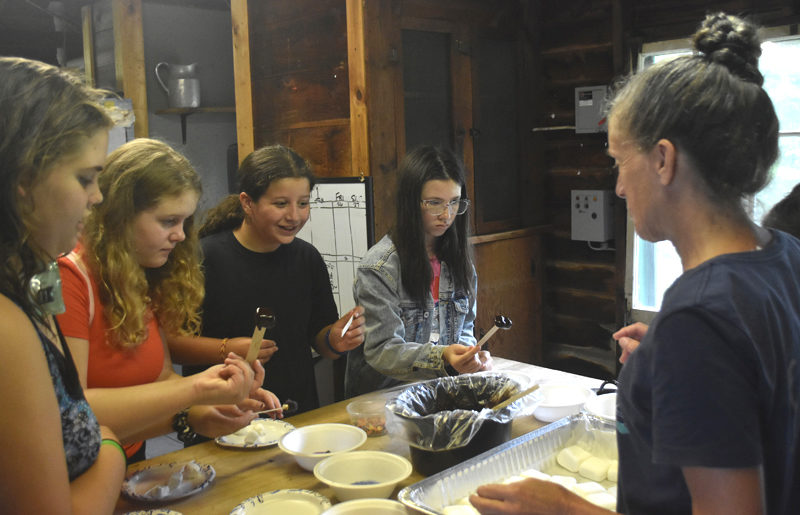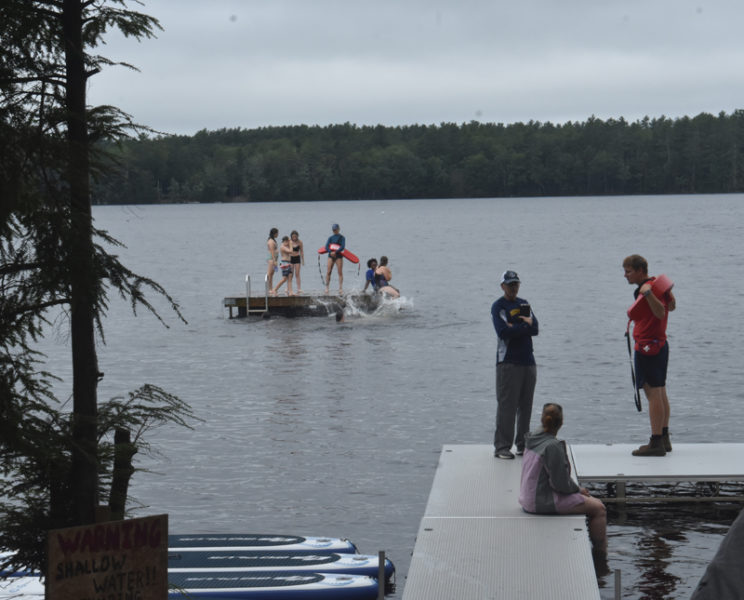
From left: Sixth and seventh grade RSU 40 students Elaine Ernest, Bella Billings, Madelyn Lermond, and Aurelia Kozubal make s’mores using math skills with guidance from Medomak Camp co-Director DeAnn Vigue. Making s’mores was the camp’s “special activity” of the day on Monday, July 29, with each child participating over the course of the day. (Molly Rains photo)
This summer, in the woods of Washington, elementary school students from across RSU 40 are taking part in quintessential summer camp activities, including playing among the camp’s tall pines, practicing archery and crafts, leaping into deep, cool water, and, during quiet moments of reflection, writing postcards home.
It is this time spent enjoying the outdoors – and the lasting friendships that form meanwhile – that define the experience of summer camp, said RSU 40 Medomak Camp co-Director Sherry Casas.
However, unlike other camps that carry an often-prohibitive price tag, she said, the students who attend Camp Medomak do so at no cost to their families.
“What this really is is opportunity,” Casas said, standing by the shore of Washington Pond on the morning of Monday, July 29, while a group of giddy campers enjoyed a swimming session nearby. “It’s important that it’s free, because a lot of the families in our community would never be able to afford a summer camp experience like this … we want to break down barriers between students.”
Made possible entirely with grant funding and the deep commitment of dedicated RSU 40 staff, including Casas, fellow co-Director DeAnn Vigue, former RSU 40 Assistant Superintendent Christina Wotton, who initiated the program, and staff who come to camp during what would otherwise be their summer break to teach and oversee the students, Medomak Camp is now in its third year in operation.
Operating out of the “junior” campus at the private Washington facility Medomak Family Camp, the RSU 40-operated Medomak Camp serves up to 200 area students each summer with a multi-week day camp experience.
In the rustic mess hall and kitchen, students are served breakfast and lunch each day; in its bunkhouses, they participate in activities like crafts and academic instruction; and on its tennis and basketball courts, open field, forest, and waterfront, they enjoy the outdoor time that Casas and the rest of the team believe is an essential part of the summer camp experience.
Washington’s Medomak Family Camp, from whom RSU 40 rents the facility, “has been absolutely amazing,” Casas said, allowing the Medomak Camp team free reign and support from allowing the campers to paint a mural in the mess hall basement to lending the camp a set of life jackets.
“They’re just supporting us in any way they can,” Casas said. “It’s been great.”
This summer, two sessions of campers enjoyed Medomak Camp programming: first, a group of fourth and fifth grade students, followed by a group of sixth and seventh graders, each for two weeks. Some fourth and fifth graders also stayed on during the second session for a four-week experience, Casas said.
In an effort to make camp as accessible as possible, transportation is provided, with students arriving by van, bus, or parent drop-off from all towns in the district, which encompasses Friendship, Union, Waldoboro, Warren, and Washington. Without free transportation, some students would be excluded from camp, Casas said, something that the Camp Medomak team wants to avoid.
“We make sure that anybody that wants to attend comes, with no obstacles. We can overcome any obstacle,” she said.
That campers come from across the district makes the summer session a unique opportunity for young RSU 40 students to make new and lasting friendships, Casas said.
“Being able to make friends in the outdoors is powerful. And these kids are from all five of our elementary schools, so they’re meeting each other, sometimes, for the first time,” she said.
Ideally, Casas continued, those friendships will ease the transition to middle school – especially for seventh graders, who will be starting at Medomak Middle School this fall.
Friendships are forged during the various activities that fill students’ days at the camp. On July 29, campers were spread across the grounds playing tennis, fishing, making s’mores, reading, quilting, and practicing archery.
Swimming is a major part of camp programming, with each child guaranteed to spend time in the water every day. Four lifeguards are employed at the camp, helping instruct students in swimming and boating.
“A lot of kids who come here have never swam,” Casas noted.
Academics are another part of the day-to-day at Medomak Camp, which is, technically, a school, Casas said – “though we don’t ever call it that,” she laughed. Much of the camp’s programming is designed to bolster campers’ academic skills: reading, writing, and math are all taught daily, albeit folded cleverly into camp-appropriate fun.
“It’s important that there continues to be an opportunity for skill practice over the summer, to decrease the slide that inevitably happens,” Casas said. “But we all know that, in the summer, kids need a break as much as anybody. This is the perfect way to continue to practice those skills.”
In one bunkhouse – which, for the duration of Camp Medomak, had been cleared of bunk beds to make room for indoor activities – students sat quietly, penning postcards to bring home to their families in an activity designed to promote writing practice. On the swing set, some students flew back and forth with their noses buried in books; “swinging and reading,” Casas said. And in the mess hall, students applied geometry and math skills while cooking with Vigue, creating s’mores treats with multicolored sprinkles.
The Camp Medomak team, made up of RSU 40 educators, has a range of expertise to offer campers. Working at the camp also allows the educators to challenge themselves professionally and apply skills that they don’t typically get to exercise in their classrooms, Casas said.
This includes Warren Community School physical educator Adam Newell, who, as a Registered Maine Guide, teaches outdoor activities like fishing and archery at Medomak Camp; MVHS math teacher Dara Economy, who on July 29 was thinking outside the box to run outdoor STEM activities for fourth- and fifth-grade students; and MVHS social studies teacher Susan Jones, who throughout the summer has instructed students in quilting, including skills like sewing, measuring, and ironing.
“The cool thing about camp is that we have so many different options, and kids can do a lot of what they want,” Casas said.
All the activities, though diverse, are built around the camp’s main goal of building confidence and learning, she said.
Medomak Camp is funded entirely by grants, with which the camp has purchased some of their own equipment, including paddleboards and canoes, to help insure the long-term viability of the operation. The team hopes the camp will be a fixture for the district for years to come, Casas said.
Aside from belonging to the district, there are no eligibility requirements for kids to attend, Casas said. Registration is capped at 100 students per session, but that number wasn’t reached this year, she said.
Above all, Casas said, Medomak Camp strives to help support RSU 40 students year-round, allowing them all to access an opportunity to make the joyful memories and lasting friendships so central to summer camp while boosting their learning and well-being along the way.

Campers swim, leap, and play in the water of Washington Pond on Monday, July 29, at RSU 40’s free summer camp. Co-Director Sherry Casas said teaching swimming and providing opportunities for water activities are central to the camp’s programming. “What this really is is opportunity … A lot of the kids who come here have never swam before,” Casas said. (Molly Rains photo)






